Racism
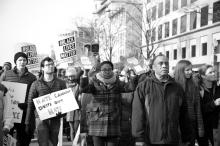
In the wake of Sandra Bland’s death, I’ve seen comments from other white Christians on social media defending the arresting officer, denying that Sandra Bland was mistreated, blaming her for what happened, and denying that race had anything to do with what happened to her. Their responses were so knee-jerk automatic that I probably could have written them ahead of time before learning anything specific about the events in question. We humans can be quite tribal, and we instinctively tend to identify with the people who are most like us.
Many whites balk at the suggestion that their views and assumptions might be racist because they know themselves to be moral people who live decent lives and maybe even have some black friends. They certainly don’t hate anybody, and they aren’t supporters of the Ku Klux Klan. Because they understand racism on an individual rather than systemic level, it seems impossible to hold together an image of oneself that contains both “good person” and “racist.”
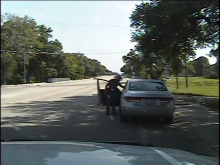
Once again we find white people blaming a black victim of violence. She’s to blame because she was “irritated.” She’s to blame because she refused to put out her cigarette. She’s to blame because she’s black.
A white response that blames Sandra Bland is a racist response. White people can get away with being irritated at police. We don’t have to be kind to officers. We can express our anger and not fear arrest.
A black person though? If a black person shows any anger, they will likely be arrested or possibly killed. And it will be construed as their fault.

The purpose of spiritual disciplines is not to earn brownie points but to restore or renew relationships. God seems most concerned to restore relationships that are most broken in society. This means that the outcry for justice from the Black Lives Matter movement provides an opportunity for the renewal of the church. The “Spiritual Practices for Confronting Racial Bias” presented by copastors Rebecca Steele and Larry Watson were these: gather in small groups that are 1) half black and half white, 2) half poor and half not poor, and 3) have a small stewardship team that redistributes tithes and offerings to those in need.
Those are indeed spiritual disciplines. And they were like the spiritual disciplines of the early church whose members not only brought tithes and offerings but they also sold possessions and brought the proceeds for redistribution among those who had financial needs (Acts 2:45). This same church, when one group (Gentiles) complained about discrimination in widows’ support, gave all the distributive power to the discriminated against (Acts 6:1-5).
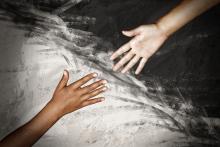
When will we as a nation develop the social, moral, or political resolve to declare a war on racism?
There is a long history in America of campaigns of eradication, identified as "wars" — a "war on crime," a "war on drugs," a "war on poverty," a "war on terrorism," etc.
An interesting commonality of many of these so-called "wars" is that the perceived enemy is often portrayed as people of color.
Why is it that we as a nation do not seek the ending of racism with the same urgency we have sought the eradication of crime, drug use, or terrorism? Is it because the perceived enemy in a "war on racism" is not primarily people of color?
24/7 Wall St. published a special report this month on the ten states with the most hate groups. Using data from the Southern Poverty Law Center, the report states that there are 784 active hate groups nationwide.
I have an idea for people who value their region's heritage so much that they continue to wave what they think is the Confederate flag (even though it is actually the battle flag of Northern Virginia).
I suggest that they volunteer to be slaves. For life.
Fact: The 19th-century Southern way of life would have been impossible without enslaved people.
Fact: The one thing that could bring back that romantic bygone era would be if, once again, some 39 percent of the population were enslaved (that's the average percentage of enslaved people in the Confederate states). But this time let's recognize that no one values personal liberty as much as Southerners. And let's take their word that the Confederate flag has nothing to do with racism. Let's encourage true Confederate patriots, especially white folks who are not racists, to volunteer to work in the fields from sunrise to sunset. There will be no pay, of course, and no bothersome education; but food, lodging, and two sets of work clothes per year will be provided. And the South will rise again.

I didn’t see the film Malcolm X in theaters. I waited to see it on video. Big mistake.
I watched it in my home, just off campus from University of Southern California, late at night when everyone else was sleeping. Another big mistake.
At the time I was living in a house with one other black person and a bunch of white and Asian friends. I was attending a mostly white school and a mostly white church and had attended a mostly white institute for urban transformation that was borne out of my church. Ironically, it was there that I was required to read The Autobiography of Malcolm X. But I never read the whole thing, only sections.
So, I sat in the dark living room, lit only by the television screen, and watched Denzel Washington bring Malcolm X to life … by myself. And there, in the dark, Malcolm’s words about Jesus hit me to the core.
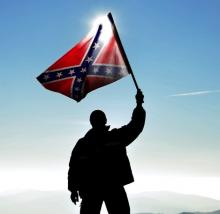
A crowd greeted the president in Oklahoma City, Okla., Wednesday night by waving Confederate flags, POLITICO reports.
Confederate flags are a rare sight in Oklahoma, which was not a member of the confederacy.
According to POLITICO:
Across the street from [President Obama's] hotel in downtown Oklahoma City, as many as 10 people waved the flags as his motorcade arrived. The group stood among a larger group of demonstrators, many of them there to support the president, who is in town ahead of a visit to a federal prison on Thursday as part of his weeklong push on criminal justice issues.
According to local news organizations, a man named Andrew Duncomb, who calls himself the “black rebel,” organized the Confederate flag demonstration. He also put together a similar protest on Saturday at the Oklahoma State Capitol — just a day after South Carolina removed its contested flag from the State Capitol grounds. His Facebook page features photos from that rally.
The president is scheduled to visit a federal prison today, the first acting president to do so. Read the full story here.
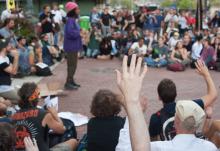
In the past few years, a new era of civil rights organizing has emerged out of the depths of tragedy and despair. The list of names of young African Americans who have died at the hand of police, out-of-control vigilantes, and hate-filled white terrorists has fostered profound lament and intense anger. The simple phrase, “Black Lives Matter” has galvanized activism, mobilizing, and organizing.
This new civil rights battle includes legislative battles at state houses like South Carolina, leading to the removal of the Confederate flag from the grounds. There is work to do in D.C. as well. Yet the real front of this new era will be on the corporate scene, on Wall Street and with economic power brokers and corporations. It is time to go “over the heads” of politicians and enter into dialogue and debate with corporations over the value and dignity of dark bodies, and how to reconstruct a moral economy that is not profiting off of people of color.
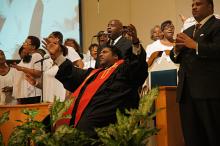
NC NAACP vs. McCrory is a necessary interruption to the institutionalized racism that is killing black and brown people. For all the talk around “black lives matter,” Rev. Barber warns, we are in danger of only affirming that black death matters if we accept that the martyrs of Charleston deserve nothing more than the removal of a Confederate flag from their state house. Yes, the flags should come down. But if they go away while the unjust laws remain, then it may be even harder for us to see that the root of injustice is in an imbalance of power.
And the fundamental power of citizenship in this country is still the franchise.
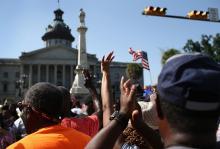
When the Confederate flag was removed from the South Carolina statehouse Friday morning, Gov. Nikki Haley spoke solemnly of the nine black churchgoers who were shot to death less than a month ago at Charleston’s Emanuel African Methodist Episcopal Church.
“We have all been struck by what was a tragedy we didn't think we would ever encounter,” Haley said of the horrifying massacre before she signed the bill with nine pens that will go to the families of the victims. “Nine amazing people that forever changed South Carolina's history."
Haley also referenced the “grace” shown by the nine families when they forgave the white gunman. She said their grace helped usher the state toward this long overdue decision. The assassinations at Emanuel AME, followed by forgiveness from the grieving families, were similarly cited by several South Carolina lawmakers as their reason for voting to remove the flag. Black Deaths Matter. That’s the painful and dangerous narrative being developed out of South Carolina. Only Black Deaths Matter. Our nation is capable of doing the right thing – such as taking down the Confederate flag in the year 2015, a flag that represents the racist, immoral, unconstitutional defense of slavery and Jim Crow – but only when black deaths happen and are met by a response deemed acceptable. Ever since this flag was raised in 1961 to send the message that South Carolina would not honor equal protection under the law, tens of thousands of small and large protests have not been enough to move the power brokers to take it down.
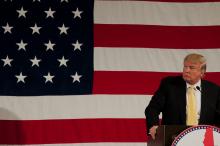
When members of the House Republican leadership met with several evangelical and Catholic leaders in 2014, they promised to our faces that they would bring serious immigration reform to the House floor for a vote. They failed to live up to that promise, deciding instead to cave to their white-washed right wing base. Some Republican members admitted to us that many of their constituents were expressing clear racial biases.
I believe Donald Trump is deliberately and directly appealing to that white racist core of the Republican Party, and that’s why he is currently number two in the Republican polls. He is selling racism and he is winning.
I know and trust Republicans and conservative friends who reject such racism — want to purge it from their party — and long for a wider, more diverse Republican Party for the future. Indeed, the Republican votes, and even impassioned speeches, to take down the Confederate flag in South Carolina show a tale of two Republican parties — and that is a hopeful contrast to the racist elements of the party to which Trump is selling himself.
It is time for them to stand up to Donald Trump and what he is selling.

I did not celebrate Independence Day this past weekend.
The truth is the United States has never been an independent nation. Built on stolen land by stolen labor, sacrificing Natives and Africans and their descendants to the mythology of “manifest destiny,” greed, oppression, and white supremacy, this has never been a nation of liberty and justice for all.
The ignoble myth of white supremacy that permeates the foundation of this country and underlies the policies and institutions that form the context of our lives has been rearing its ugly head so much lately that it cannot be as easily ignored or denied as it has been in the past. The recent massacre in Charleston and the burning of African-American churches add even more reasons to the hundreds of thousands to awaken to the reality of racism that undermines best ideals of this nation. Our country has failed to atone for, or even critically examine, its history of racial oppression.

For white people who care about racism, it’s time we stop pointing the finger at others and start confessing our own sin.
Every white person I know denounces the blatant, tragic racism of Dylann Roof. They abhor that this sort of thing could possibly happen in 2015. They can’t believe there still exists people who are THAT racist, who would fly the Confederate flag, who could possibly say (x and y and z). They shudder and shake at such insanity.
Many white moderates and conservatives I know would express such a view.
And some of those white people are also quick to point out “structural racism.” Chastising the “lone wolf” fallacies of those who think Roof acted outside of a racist context, these folks stress the importance of systems. For them, racism isn’t simply perpetrated by extremist Southerners or a few power-hungry police officers. Rather, it’s sustained primarily in local and national policies. With their cultivated, educated, birds-eye view, these white people expose “white privilege.” They, ahem, get it.
This is the enlightened white liberal par excellence.
But both views enable an understanding of racism that exists outside our own selves. Racism doesn’t exist outside our own selves, white folks. It doesn’t simply exist in THAT guy. It’s not just a vague political force in policy. It exists in you. It exists in me. I am racist. I am a white supremacist. And if you're white and reading this, you probably are too.

Our nation doesn't have to be this way. Churches do not have to be burning. Innocent lives do not have to be lost. Together, we can bring an end to this dark night and step into the light of justice and peace. But it will take a lot more than blog posts and prayer vigils. It's going to take those of us with privilege changing the way we live our lives; changing the way we teach our children; changing the way we interact in the world.
This is hard work, but it's work that must be done if we are to see an end to this violence and injustice in our nation. It begins with a choice to see and live in our world differently, starting today.
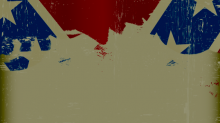
I own a Confederate flag. Growing up, the flag meant little more to me than school spirit, pep rallies, and Southern pride … until I left East Tennessee. I’ll never forget the moment things began to change. I moved into my college dorm room and established my new home at Eastern University in Philadelphia. I carefully set up my desk, put my posters on the wall, and displayed my high school yearbook — with a Confederate flag on the cover — proudly on my bookshelf.

It is painfully true that in our time, in this year, in the United States, there is still no safe space for black people in America — even in their own churches. Racism is America’s original sin. It expresses itself explicitly and overtly in what we horribly saw last week in a black church, but racism continues on, implicitly and covertly, in American institutions and culture.

The past 12 months of violence against unarmed black bodies continues to draw national attention to the ongoing challenge of police brutality in the United States. Under the collective action call of #blacklivesmatter, activists and concerned citizens across the country challenge the ideology of white supremacy undergirding our criminal justice system and demand an end to state violence against black bodies. Yet the #blacklivesmatter movement is about more than an end to police brutality; it is call for the health, wholeness, and vitality of all black communities and a world in which black lives are no longer systemically and intentional targeted for demise. This includes an account of the physical environment in which black communities reside.
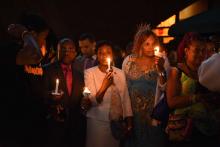
The sickness in our society is driven by the way we mistrust and pull away from one another; how we decide to care only about ourselves and our immediate families; the way we choose to serve only those who are like us – same race, ethnic background, sexual orientation, religion, political views.
Everyone else gets minimized and pushed away. We arm ourselves to protect our shrinking little space. We live like moles, wary of predators.
In guns we trust. In fear we live.

White people can no longer afford to deny the violent racism that infects our lives. Rather, we must take responsibility for it. The first thing we need to do is to name it. Yes, name it in people like the terrorist who killed the nine people at Emmanuel last Wednesday. Name it in our political, economic, and entertainment systems that propagate and benefit from racist structures. For example, did you know that currently, “the U.S. has a greater wealth gap between whites and blacks than South Africa did during apartheid?” Name it for the sinful, demonic structure that it is.
But just as important, name the racism that infects you. It’s not helpful to just name racism in others if we don’t also take responsibility for the racism within each of us. Name it in yourself so that you can repent from it. And once you repent from it, name it again and again. Racism is so embedded in our culture that its evil will surely return to our lives.
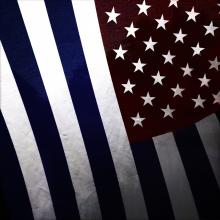
Please don’t fail to recognize this vital moment in American history: when our fellow citizens screamed for equality, marched for recognition, and pleaded for justice. Because someday the next generation will ask us: What did you do?
And so today we must ask ourselves: What are we doing? What are we seeing? What does this all mean?
Because the last few years within our country — a continuation of the past hundreds of years — have been socially jarring for a society that considers itself a modernized, technologically advanced, and morally superior nation